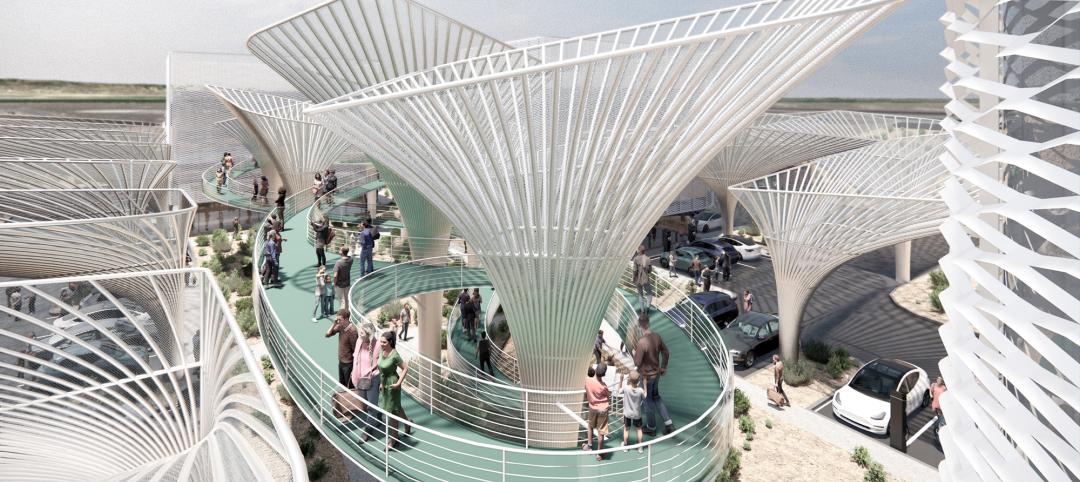Despite a steep economic recession during the first half of 2020, compensation for architectural staff at U.S. architecture firms essentially held flat over the 2019–2021 period, according to the American Institute of Architects (AIA) biannual Compensation Report.
“Like many professions, architecture firms across the country have had to weather an incredibly volatile period,” said AIA Chief Economist Kermit Baker, PhD, Hon. AIA. “While we have seen an unprecedented recovery in architecture firm billings during 2021, this report provides a valuable snapshot of the impact the pandemic had last year on firm compensation and employment levels.”
According to the report, architecture firms lost 16,000 positions between February and their low in July of 2020, which is 8% of all payroll positions at firms. Meanwhile the overall economy lost over 21 million payroll positions between February and April of 2020, or 16.5% of total payrolls.
The biannual compensation report provides salary data for more than 40 architecture firm positions in cities across the United States as well as industry salary trends and analysis on where the market is headed.
Key findings of this year’s report, include:
— Average compensation for recent architecture graduates was just under $56,000, however, there continues to be considerable variation in starting compensation nationally, with average starting compensation ranging from around $48,000 to $69,000, depending on the region of the country.
— Despite generally outpacing compensation growth in the broader economy, architect compensation is also much more volatile. Between 2019 and 2021, architect compensation increased 0.3% per year, while all professional compensation increased 2.4% annually, and 3.1% for all private workers.
— At firms with fewer than 50 employees, benefits as a share of base pay declined to 14.4% on average in 2020, after averaging just over 18% nationally two decades ago.
In addition to the compensation survey, AIA offers members a salary calculator to learn topline data on architecture position salary ranges by region of the country.
Complete results from the 2021 AIA Compensation Survey can be purchased online.
Related Stories
Steel Buildings | Apr 6, 2023
2023 AISC Forge Prize winner envisions the gas station of the future
Forge Prize winner LVL (Level) Studio envisions a place where motorists can relax, work, play, shop, or perhaps even get healthcare while their vehicles charge.
Architects | Apr 6, 2023
New tool from Perkins&Will will make public health data more accessible to designers and architects
Called PRECEDE, the dashboard is an open-source tool developed by Perkins&Will that draws on federal data to identify and assess community health priorities within the U.S. by location. The firm was recently awarded a $30,000 ASID Foundation Grant to enhance the tool.
Architects | Apr 6, 2023
Design for belonging: An introduction to inclusive design
The foundation of modern, formalized inclusive design can be traced back to the Americans with Disabilities Act (ADA) in 1990. The movement has developed beyond the simple rules outlined by ADA regulations resulting in features like mothers’ rooms, prayer rooms, and inclusive restrooms.
Market Data | Apr 6, 2023
JLL’s 2023 Construction Outlook foresees growth tempered by cost increases
The easing of supply chain snags for some product categories, and the dispensing with global COVID measures, have returned the North American construction sector to a sense of normal. However, that return is proving to be complicated, with the construction industry remaining exceptionally busy at a time when labor and materials cost inflation continues to put pricing pressure on projects, leading to caution in anticipation of a possible downturn. That’s the prognosis of JLL’s just-released 2023 U.S. and Canada Construction Outlook.
Cladding and Facade Systems | Apr 5, 2023
Façade innovation: University of Stuttgart tests a ‘saturated building skin’ for lessening heat islands
HydroSKIN is a façade made with textiles that stores rainwater and uses it later to cool hot building exteriors. The façade innovation consists of an external, multilayered 3D textile that acts as a water collector and evaporator.
Market Data | Apr 4, 2023
Nonresidential construction spending up 0.4% in February 2023
National nonresidential construction spending increased 0.4% in February, according to an Associated Builders and Contractors analysis of data published by the U.S. Census Bureau. On a seasonally adjusted annualized basis, nonresidential spending totaled $982.2 billion for the month, up 16.8% from the previous year.
Sustainability | Apr 4, 2023
ASHRAE releases Building Performance Standards Guide
Building Performance Standards (BPS): A Technical Resource Guide was created to provide a technical basis for policymakers, building owners, practitioners and other stakeholders interested in developing and implementing a BPS policy. The publication is the first in a series of seven guidebooks by ASHRAE on building decarbonization.
Sustainability | Apr 4, 2023
NIBS report: Decarbonizing the U.S. building sector will require massive, coordinated effort
Decarbonizing the building sector will require a massive, strategic, and coordinated effort by the public and private sectors, according to a report by the National Institute of Building Sciences (NIBS).
Education Facilities | Apr 3, 2023
Oklahoma’s Francis Tuttle Technology Center opens academic center for affordable education and training
Oklahoma’s Francis Tuttle Technology Center, which provides career-specific training to adults and high school students, has completed its Francis Tuttle Danforth Campus—a two-story, 155,000-sf academic building. The project aims to fill the growing community’s rising demand for affordable education and training.
Sports and Recreational Facilities | Mar 30, 2023
New University of St. Thomas sports arena will support school's move to Division I athletics
The University of St. Thomas in Saint Paul, Minn., last year became the first Division III institution in the modern NCAA to transition directly to Division I. Plans for a new multipurpose sports arena on campus will support that move.

















